HUMANITARIAN RESPONSE
Our projects focus on helping people cope in humanitarian crises and conflict
RADIO IN NEPAL – MILIJULI NEPALI
COMMUNICATION FOR SYRIAN REFUGEES – DAWAWEEN
TACKLING EBOLA IN SIERRA LEONE
HUMANITARIAN RESPONSE
Our projects focus on helping people cope in humanitarian crises and conflict
RADIO IN NEPAL – MILIJULI NEPALI
COMMUNICATION FOR SYRIAN REFUGEES – DAWAWEEN
TACKLING EBOLA IN SIERRA LEONE
Milijuli Nepali
HUMANITARIAN/NEPAL
I’m positive that the most important part is the planning – specifically that Lifeline programming is not like journalism. It’s not about grabbing attention for news. Understanding this kind of programming is crucial to us. How to communicate with the community and thinking about their needs is essential. Anyone doing this kind of production must be very clear about this.”
Bhuwan Timilsina, Senior Producer, Milijuli Nepali
BACKGROUND STORY
A 7.8 magnitude earthquake struck Nepal on 25 April 2015 – causing devastation for 1.8 million people.
With such high levels of humanitarian need, the challenge was to provide people across Nepal with accurate and trusted information to help them first survive and then to begin to rebuild their homes and their lives. Within hours of the earthquake, the challenge for BBC Media Action was to work with the BBC Nepali Service to communicate lifesaving information to people in immediate need. Importantly, the partners we trained were on air and were prepared.
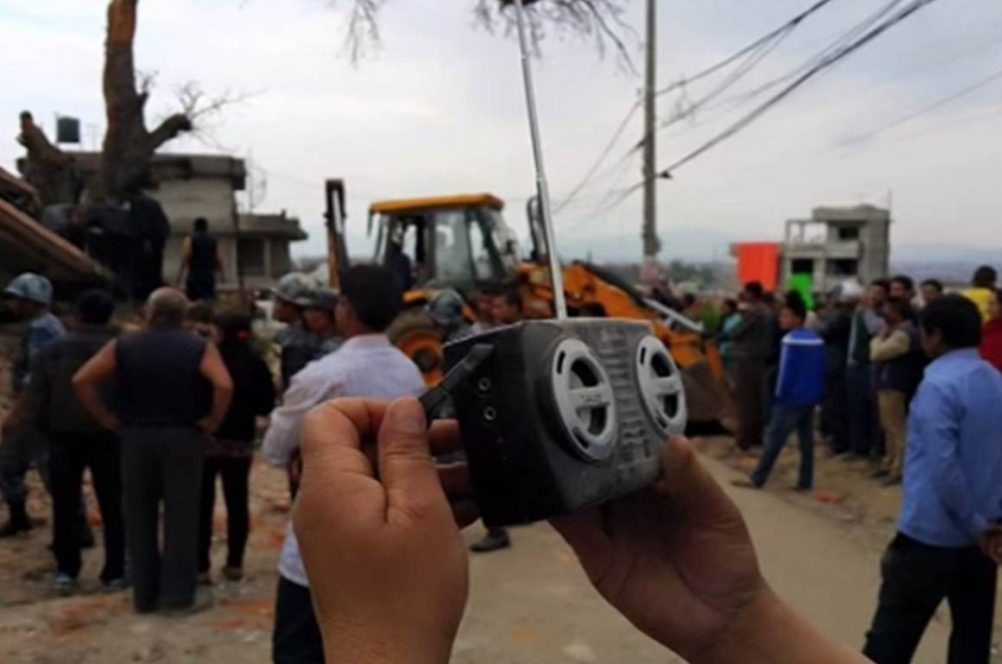
THE MEDIA IN ACTION
We knew there was an earthquake risk and our advance preparation meant we were ready for action straight away. Pre-disaster training delivered by BBC Media Action enabled several radio partners to begin broadcasting Lifeline programming (special media programming for communities affected by humanitarian crises) within hours of the Nepal earthquake happening. Training was integral to the project, providing local radio stations and humanitarian organisations with tailored editorial and technical support for them to produce local programmes.
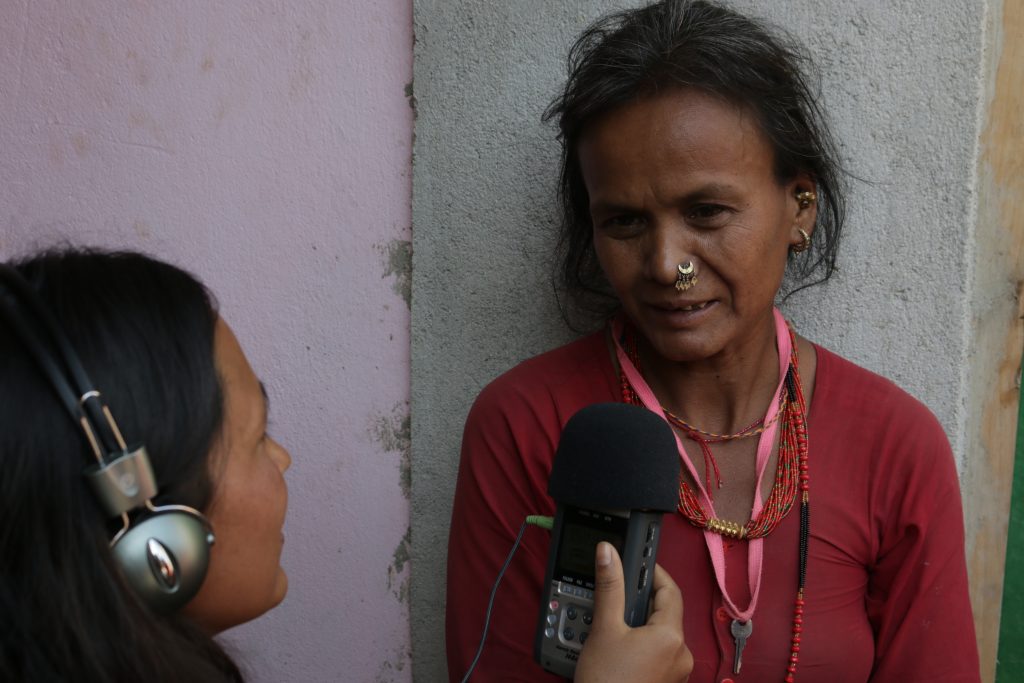
Within a week, we had launched Milijuli Nepali (Together Nepal), communicating information about where to receive aid and how to stay safe and healthy. The 15-minute programmes were broadcast twice a day on the BBC Nepali Service on 103 FM in the Kathmandu Valley, Radio Nepal and on 400 other radio stations across Nepal, together extending across the entire country. Topics included questions about when another earthquake might strike, the protection of children, how to stay safe during an aftershock, building temporary shelters and health and hygiene.
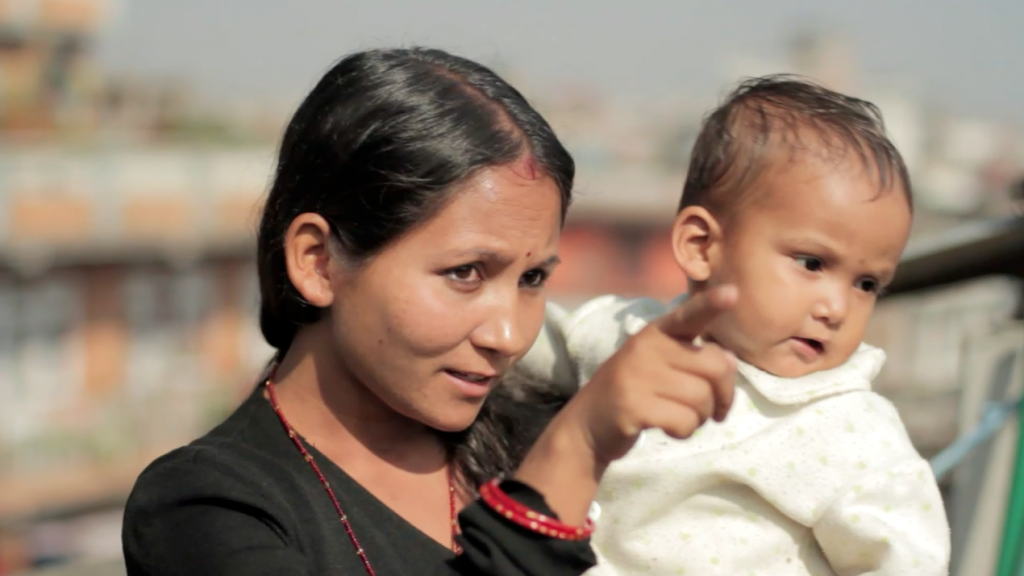
Milijuli Nepali also included the production and broadcast of 20 episodes of a new radio drama in collaboration with the Nepal national broadcaster, Radio Nepal, titled Katha Maala (Garland of Stories). The drama was designed to encourage communities in the earthquake affected areas to prepare for and respond to the challenges of the monsoon and winter seasons. We worked in partnership with Radio Nepal to co-produce this drama, and Radio Nepal was the primary broadcast partner. The drama was also broadcast by 11 partner radio stations of BBC Media Action.
IMPACT
In total 112 episodes of Milijuli Nepali were produced and broadcast through 306 partner radio stations, Radio Nepal and the BBC Nepali Service, reaching 2.16 million people nationally.
Between 90% and 95% of the affected population trusted the information and, as a result, knew how to get support from local services. As importantly, 80% made an effort to solve a neighbourhood or community problem related to reconstruction.
Bir Bahadur Tamang, a resident of Satyadevi, Dhading district, had been a secretary of the Village Development Committee (VDC). Like many in his village, he was living in a temporary shelter when he shared his thoughts with the visiting Milijuli Nepali team:
“Listening to Milijuli Nepali helps us find information about how it is necessary to reconstruct using the right building methods. We were able to find out that we could approach government engineers, so that the earthquake victims could learn about the building code.” He felt the programmes were essential, particularly for people in poorly connected, remote communities where self-reliance was the only way to survive.
Listen to an episode here:
BACKGROUND STORY
A 7.8 magnitude earthquake struck Nepal on 25 April 2015 – causing devastation for 1.8 million people.
With such high levels of humanitarian need, the challenge was to provide people across Nepal with accurate and trusted information to help them first survive and then to begin to rebuild their homes and their lives. Within hours of the earthquake, the challenge for BBC Media Action was to work with the BBC Nepali Service to communicate lifesaving information to people in immediate need. Importantly, the partners we trained were on air and were prepared.

THE MEDIA IN ACTION
Pre-disaster training delivered by BBC Media Action enabled several radio partners to begin broadcasting Lifeline programming within hours of the Nepal earthquake happening. Training was integral to the project, providing local radio stations and humanitarian organisations with tailored editorial and technical support for them to produce local level programmes.

We knew there was an earthquake risk and our advance preparation meant we were ready for action straight away. Pre-disaster training delivered by BBC Media Action enabled several radio partners to begin broadcasting Lifeline programming (special media programming for communities affected by humanitarian crises) within hours of the Nepal earthquake happening. Training was integral to the project, providing local radio stations and humanitarian organisations with tailored editorial and technical support for them to produce local programmes.

Milijuli Nepali also included the production and broadcast of 20 episodes of a new radio drama in collaboration with the Nepal national broadcaster, Radio Nepal, titled Katha Maala (Garland of Stories). The drama was designed to encourage communities in the earthquake affected areas to prepare for and respond to the challenges of the monsoon and winter seasons. We worked in partnership with Radio Nepal to co-produce this drama, and Radio Nepal was the primary broadcast partner. The drama was also broadcast by 11 partner radio stations of BBC Media Action.
IMPACT
In total 112 episodes of Milijuli Nepali were produced and broadcast through 306 partner radio stations, Radio Nepal and the BBC Nepali Service, reaching 2.16 million people nationally.
Between 90% and 95% of the affected population trusted the information and, as a result, knew how to get support from local services. As importantly, 80% made an effort to solve a neighbourhood or community problem related to reconstruction.
Bir Bahadur Tamang, a resident of Satyadevi, Dhading district, had been a secretary of the Village Development Committee (VDC). Like many in his village, he was living in a temporary shelter when he shared his thoughts with the visiting Milijuli Nepali team:
“Listening to Milijuli Nepali helps us find information about how it is necessary to reconstruct using the right building methods. We were able to find out that we could approach government engineers, so that the earthquake victims could learn about the building code.” He felt the programmes were essential, particularly for people in poorly connected, remote communities where self-reliance was the only way to survive.
Listen to an episode here:
Dawaween
HUMANITARIAN / SYRIA
My lessons are – you have to be responsive, flexible, and you have to adapt to changing circumstances and we always made sure the actors, scriptwriters and all the people involved were from the community itself.”
Julie Boutros, Assistant Project Manager, Middle East & Europe
Dawaween
HUMANITARIAN / SYRIA
My lessons are – you have to be responsive, flexible, and you have to adapt to changing circumstances and we always made sure the actors, scriptwriters and all the people involved were from the community itself.”
Julie Boutros, Assistant Project Manager, Middle East & Europe
BACKGROUND STORY
Over 3 million people have been displaced by the conflict in Syria. But even in the relative safety of Lebanon and Jordan where many have fled, confusion persists.
BBC Media Action’s challenge was how to provide practical advice for them on critical issues such as where to get medical treatment and vaccinations, how to give information on trauma, immigration and incidents of domestic violence.
Our response was to develop short films and air them in community centres, providing information and support for people coping with life as refugees.
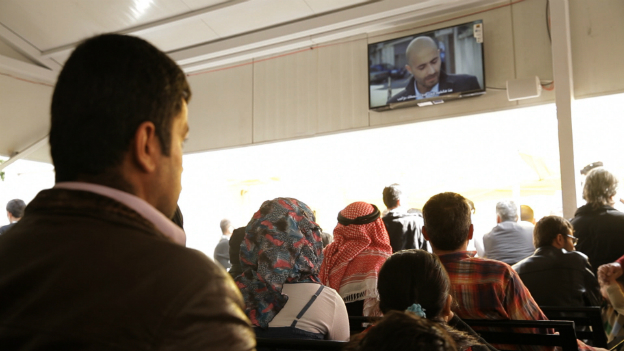
THE MEDIA IN ACTION
In 2014, BBC Media Action partnered up with Relief International, to establish a network of communication hubs (promoted publicly as Dawaween in Arabic) and provide Syrian refugees and Lebanese host communities with information. In 2015, we partnered with Relief International again and launched two mobile communication units (in north Lebanon and the Beqaa Valley) providing the same services. We developed communication material for all the hubs.
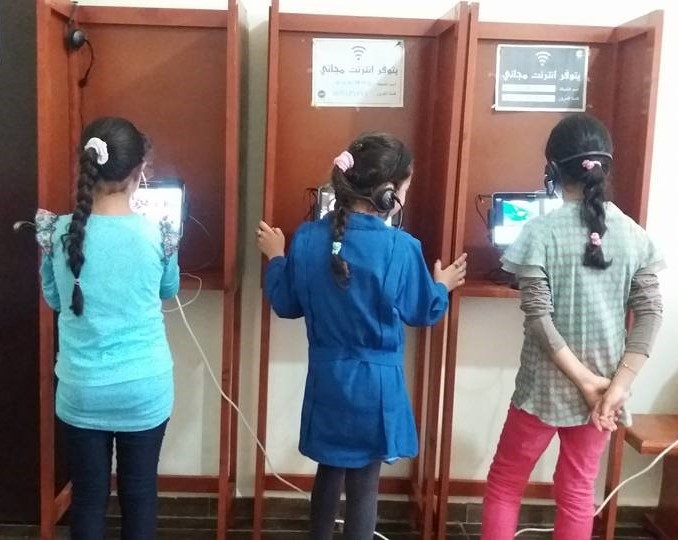
We:
- Produced a mobile application of Lifeline content and contacts for Syrian refugees
- Produced a website for NGOs providing practical humanitarian communication advice and information
- Produced 20 information films for refugees
- Established hubs within local NGOs and near refugees’ informal settlements
- Established mobile hubs for refugees away from stationary hubs
- Trained NGO staff on communication with refugees
- Screened content across Lebanon in all UNHCR registration centres, three community centres, 12 communication hubs and two mobile hubs
IMPACT
We are constantly faced with people who are trying to manipulate us, but we can get positive information that can help us.”
Syrian female refugee, focus group discussion, Bar Elias Hub
These videos and communication tools will create more compassion between Lebanese people and Syrians. It will at least make people think twice and possibly encourage people to want to know Syrians and get to know them.”
Syrian male refugee, focus group discussion, Bar Elias Hub
Our audience really appreciated our content, finding it relevant, enjoyable and useful. We provided training to NGO workers in the hubs, which greatly improved their communication with the refugees and their understanding of the conditions they were facing.
We also showed the NGO workers how to use all the IT equipment and they now have the skills they need to communicate with refugees as well as access to extensive and diverse audio-visual content to conduct their own information sessions.
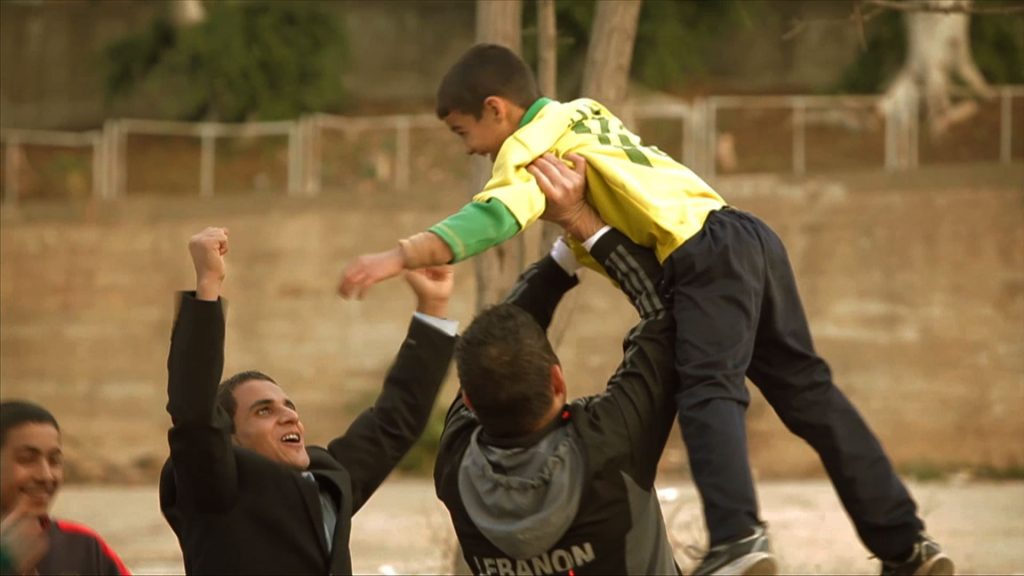
For more about Dawaween, watch these:
BACKGROUND STORY
Over 3 million people have been displaced by the conflict in Syria. But even in the relative safety of Lebanon and Jordan where many have fled, confusion persists.
BBC Media Action’s challenge was how to provide practical advice for them on critical issues such as where to get medical treatment and vaccinations, how to give information on trauma, immigration and incidents of domestic violence.
Our response was to develop short films and air them in community centres, providing information and support for people coping with life as refugees.

THE MEDIA IN ACTION
In 2014, BBC Media Action partnered up with Relief International, to establish a network of communication hubs (promoted publicly as Dawaween in Arabic) and provide Syrian refugees and Lebanese host communities with information. In 2015, we partnered with Relief International again and launched two mobile communication units (in north Lebanon and the Beqaa Valley) providing the same services. We developed communication material for all the hubs.

We:
- Produced a mobile application of Lifeline content and contacts for Syrian refugees
- Produced a website for NGOs providing practical humanitarian communication advice and information
- Produced 20 information films for refugees
- Established hubs within local NGOs and near refugees’ informal settlements
- Established mobile hubs for refugees away from stationary hubs
- Trained NGO staff on communication with refugees
- Screened content across Lebanon in all UNHCR registration centres, three community centres,12 communication hubs and two mobile hubs
- Created a website www.syrialifeline.org in English and Arabic
IMPACT
We are constantly faced with people who are trying to manipulate us, but we can get positive information that can help us.”
Syrian female refugee, focus group discussion, Bar Elias Hub
These videos and communication tools will create more compassion between Lebanese people and Syrians. It will at least make people think twice and possibly encourage people to want to know Syrians and get to know them.”
Syrian male refugee, focus group discussion, Bar Elias Hub
Our audience really appreciated our content, finding it relevant, enjoyable and useful. We provided training to NGO workers in the hubs, which greatly improved their communication with the refugees and their understanding of the conditions they were facing.
We also showed the NGO workers how to use all the IT equipment and they now have the skills they need to communicate with refugees as well as access to extensive and diverse audio-visual content to conduct their own information sessions.

For more about Dawaween, watch these:
Tackling Ebola in Sierra Leone
HUMANITARIAN / SIERRA LEONE
My lessons are – you have to be responsive, flexible, and you have to adapt to changing circumstances and we always made sure the actors, scriptwriters and all the people involved were from the community itself.”
Julie Boutros, Assistant Project Manager, Middle East & Europe
Tackling Ebola in Sierra Leone
HUMANITARIAN / SIERRA LEONE
My lessons are – you have to be responsive, flexible, and you have to adapt to changing circumstances and we always made sure the actors, scriptwriters and all the people involved were from the community itself.”
Julie Boutros, Assistant Project Manager, Middle East & Europe
BACKGROUND STORY
When the World Health Organization declared the Ebola outbreak in West Africa an international public health emergency in 2014, the biggest challenge was not healthcare, it was persuading people to change their usual behaviour. This was often in ways they considered unthinkable – asking them to avoid touching sick relatives and conduct funerals in ways that grieving people considered disrespectful.
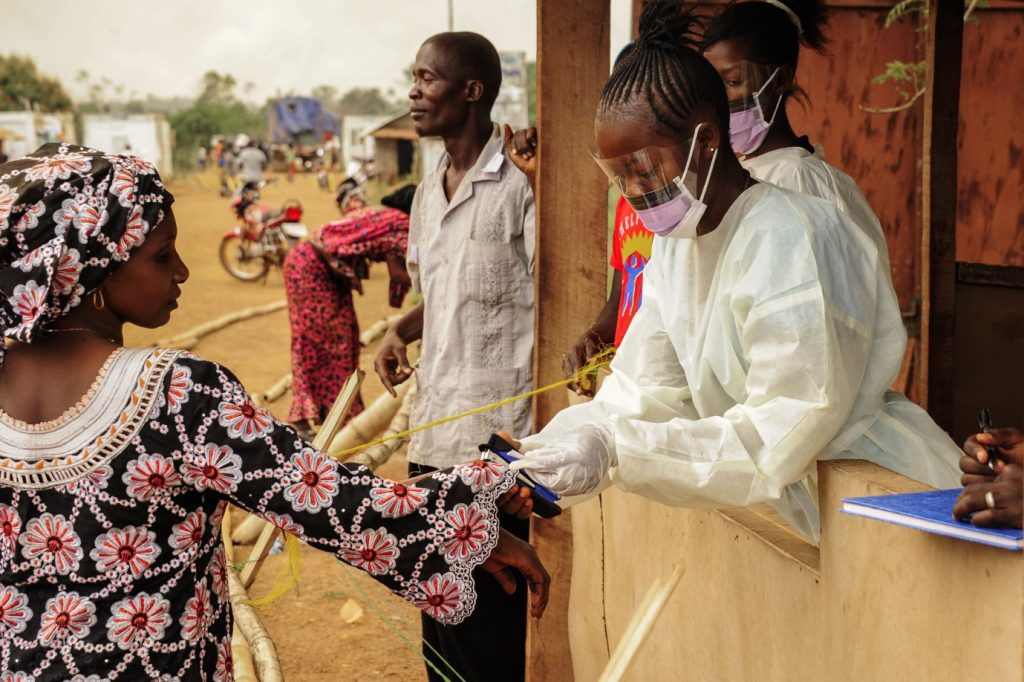
THE MEDIA IN ACTION
Trust in officials in the early days of the outbreak was low but the BBC was a trusted name. We were already working with 40 local radio stations on the ground in Sierra Leone and able to respond quickly.
Our national discussion programme Tok Bot Salone (Talk About Sierra Leone) helped people to make sense of the unfolding crisis, learn what to do and influenced the official response. Our Ebola work expanded to include: local language health announcements, effective use of WhatsApp to share accurate information, a radio magazine programme and a radio drama in Sierra Leone and Liberia – and lifeline training in nine countries
Our close relationships with local radio stations meant we could train producers to make radio programmes about Ebola in local languages, featuring local people – crucial in gaining their co-operation.
[People] feel able to contribute. They feel that the fight is theirs. I feel I am doing the right thing.
Isatu Kamara, radio producer & BBC Media Action trainee
IMPACT
Communication was the crux of the response to Ebola.
Kathy Hageman, US Centers for Disease Control and Prevention
In Sierra Leone, more than two thirds of all adults listened to our radio shows to learn how to stay safe.
BACKGROUND STORY
When the World Health Organization declared the Ebola outbreak in West Africa an international public health emergency in 2014, the biggest challenge was not healthcare, it was persuading people to change their usual behaviour. This was often in ways they considered unthinkable – asking them to avoid touching sick relatives and conduct funerals in ways that grieving people considered disrespectful.

THE MEDIA IN ACTION
Trust in officials in the early days of the outbreak was low but the BBC was a trusted name. We were already working with 40 local radio stations on the ground in Sierra Leone and able to respond quickly.
Our national discussion programme Tok Bot Salone (Talk About Sierra Leone) helped people to make sense of the unfolding crisis, learn what to do and influenced the official response. Our Ebola work expanded to include: local language health announcements, effective use of WhatsApp to share accurate information, a radio magazine programme and a radio drama in Sierra Leone and Liberia – and lifeline training in nine countries
Our close relationships with local radio stations meant we could train producers to make radio programmes about Ebola in local languages, featuring local people – crucial in gaining their co-operation.
[People] feel able to contribute. They feel that the fight is theirs. I feel I am doing the right thing.
Isatu Kamara, radio producer & BBC Media Action trainee
IMPACT
Communication was the crux of the response to Ebola.
Kathy Hageman, US Centers for Disease Control and Prevention
In Sierra Leone, more than two thirds of all adults listened to our radio shows to learn how to stay safe.